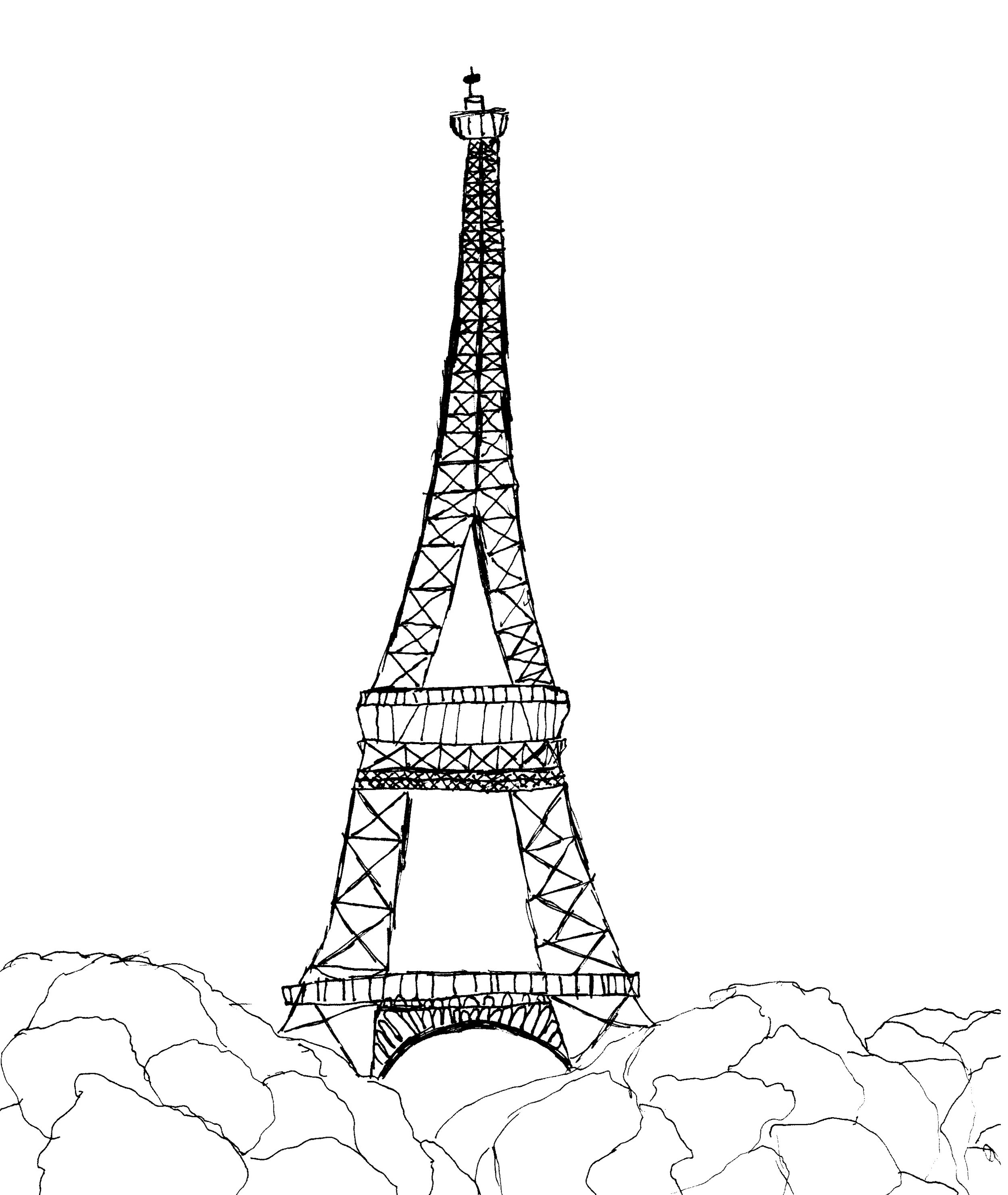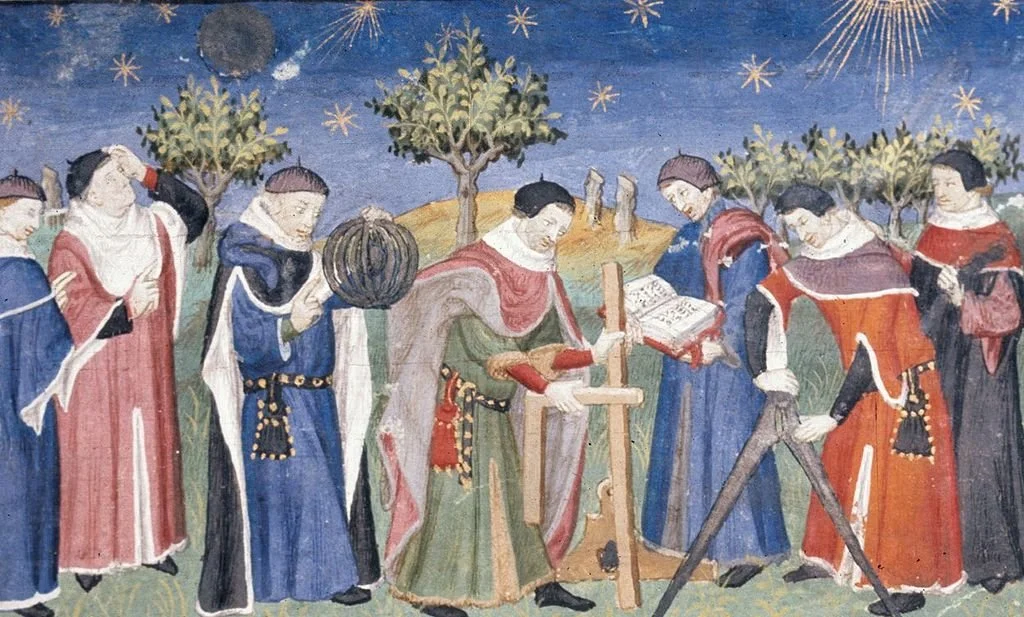Creators of Futures Since 1257
Millions of college and university students around the world descended upon campuses this fall to engage in learning, research, socialization, and discourse. The French capital has hosted university students for well over eight hundred years in schooling situations that have endured and evolved while educating young people. Initially, cathedral schools educated young males destined for the clergy, such as the future Pope Innocent III who was among the earliest students in Paris, completing his studies there in 1182. Additional demand among the nobility and the need for literate government administrators gradually expanded the student population while the number of cathedral schools and locations grew under Charlemagne’s direction in the 8th century.
Image of clerks studying astronomy and geometry from La Vraye Histoire du Bon Roy Alixandre, authored by Pseudo-Callisthenes, early 15th century France. Image credit: The British Library, Record Number - 007415. See page for author, Public domain, via Wikimedia Commons
In Paris, access to such schooling extended beyond the wealthy in 1180, when an Englishman known as Sir Josse (Jocius) spearheaded the creation of the first college in France, the Collège des Dix-Huit. Inspired by educational communities he saw during a visit to the Middle East and charitable services provided to the sick and poor by the Hospital of Nôtre Dame in Paris, Jocius laid the groundwork to fund an education for 18 poor students.
King Philippe Auguste formalized the predecessor of the Université de Paris in 1200 by conferring the status of ‘universitas’, meaning a guild of scholars, on educational groups that were expressly subject only to church law rather than royal governance. A diploma program for Arts, Law, Medicine, and Theology under the oversight of the Nôtre-Dame Cathedral school was formalized, drawing students and esteemed scholars from various European countries. They were divided into language and regional-based groups called nations though the language of instruction was Latin. The curriculum was based on seven liberal arts of classical education: Grammar, Rhetoric, and Logic comprised the Trivium that developed communication and critical thinking skills and the Quadrivium of Arithmetic, Geometry, Astronomy, and Music rounded out mathematical and scientific knowledge.
Chapel of the main Sorbonne building, Paris, France. Image credit: Mbzt, CC BY-SA 4.0, via Wikimedia Commons
The reputation of the university attracted students who would go on to hold significant positions in European medieval life – sons of royalty and nobility, budding clergymen and future archbishops, and young men who would later be named Pope. Robert de Sorbon, a teacher who rose from the peasant class to become the chaplain for King Louis IX through his religious education, acquired several buildings on the Left Bank of the Seine to start the Maison de Sorbonne. This college of theology provided lodging and an education for students who were neither sponsored by the Church nor of sufficient wealth to fund their studies. Upon official recognition by the king in 1257 followed by an endorsement by Pope Alexander IV in 1259, ‘la Sorbonne’ became the most prestigious theology school in France that produced “Créateurs de futurs depuis 1257“, the school’s motto.
The Collège de Sorbonne built a library and chapel and obtained the first printing press in France. The future Cardinal Richelieu who served as the chief minister to King Louis XIII was a student and then an administrator at the Sorbonne in the early 17th century. He bequeathed his own library and considerable funds to the college upon his death in 1642 and is buried in the chapel that was erected during his administration. The school’s tides turned just after the French Revolution, when First Republic decreed that all colleges and universities were to cease operation. Under Napoleon, the University of France was created as part of his educational vision with its theology school based at the former location of the Sorbonne.
The university system evolved along with governmental and societal changes throughout the ‘long 19th century’ in France. By the Belle Époque (1871–1914) of the Third Republic, all of the Sorbonne’s buildings save the chapel had been replaced or renovated to house the Faculté des Arts et Sciences whereas the theology school was disbanded with the clear separation of church and state. Instruction in a variety of disciplines expanded along with the creation of research laboratories, admission for a broader demographic of students including (initially on a limited basis) women, and the establishment of university programs in other locations across the Parisian metropolis. In the wake of student protests over inadequate facilities, the war in Southeast Asia, and other issues during the 1960s, Minister of Education Edgar Faure was tasked with leading educational reform through the legislature into taking concrete action. The Université de Paris was divided into thirteen universities that were again reorganized in the 2010s. Today, Sorbonne Université combines the arts, humanities, and literature programs of the former Paris-Sorbonne University (Paris IV) with the science and medicine programs of the former Université Pierre-et-Marie-Curie (Paris VI) to encompass a world-class university joining over 50,000 students with some 12,000 researchers, professors, and staff to continue the mission of creating futures since 1257.
Jeu de français
Although l’Institut français d’Oak Park was founded in 2016, much later than the Sorbonne, we are delighted to create a community of French language learners and users just as other educational institutions have supported students in their own quests for knowledge, skills, and camaraderie.
Put your language abilities to work by translating educational terms from English to French in the crossword below.
Subscribe to our newsletter to receive Art de vivre posts, information about courses, Conversation Café, special events, and other news from l’Institut français d’Oak Park.



